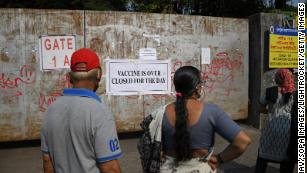Why I'm grateful I lost my parents before India's horrific Covid-19 surge
On December 11, 2020, I found myself in an ambulance, rushing my father from a government hospital to a private one, in search of a state-of-the-art ventilator in the eastern Indian city of Kolkata. The day before, my mother had breathed her last.
I lost both my parents to the coronavirus in a span of 10 days. I am still grieving six months later but I am also grateful that Covid-19 found my family last year, and not now. Here's why.
As I write this, India, where I've lived all of my life and worked as a journalist for the past decade, is experiencing one of the world's worst outbreaks of the coronavirus. It is the third country in the world -- after Brazil and the United States -- to cross 300,000 official deaths and we've set new grim records for the highest single-day figure for infections globally.
The health inequities that have led to India's Covid crisis developed over time. And yet, at the start of the year, at a virtual gathering at the World Economic Forum, Prime Minister Narendra Modi boasted about how India had "saved humanity from a big disaster by containing corona(virus) effectively", following the first wave. In early March, our health minister Harsh Vardhan declared that the country was "in the endgame" of the pandemic.
At that point, many across India let down their guard but I felt a very real, yet inexplicable fear. I was convinced the worst was yet to come.
After my mother died, one of the doctors who had been treating her took me into their confidence and suggested that I move my critically-ill father to a private hospital that would have better ventilators. Cue, the scramble in an ambulance to find more suitable care.
By the end of April, the doctor's concerns and my fear had both proven to not be unfounded.
Amid a flurry of pre-state election rallies and huge religious gatherings, the numbers of infections and deaths began to overwhelm the nation. Hospitals ran out of basics such as oxygen, and social media became a hotline for all manner of Covid aid, with strangers responding to each other's desperate pleas for assistance.
"As Modi extolled the quantities of supplies provided, the conversation about the quality of care was put on the back burner"
Pallabi Munsi
It's easy to see why, with doctors pleading on social media for resources to be made available, and families queuing up outside hospitals, praying for a bed -- if they're lucky, maybe one with oxygen support.
But as a clear, steep shortage of resources has doubled the devastation of this second wave, the systemic failings of India's central and state governments to provide quality care is no longer just being discussed in hushed tones in hospital corridors.
In a country of 1.39 billion people, prior to the pandemic, there were only 17,000 ventilators in public healthcare facilities across India. In the rush to scale up supply to meet the demand created by Covid-19, reports have emerged of state healthcare facilities in the states of Punjab, Jharkhand and Maharashtra being sent defective machines; contracts to manufacture ventilators being given to companies with no prior experience; and ventilators sitting uninstalled with some hospitals having no means to connect the gas to the machines.
With a Covid-19 vaccine patent waiver likely, time to rethink global intellectual property rules
To be sure, the central government, responding to these allegations, has ordered an "immediate" audit of the installation and operational status of ventilators it has provided. It remains unclear what the audit will reveal -- if anything at all: a few weeks ago, the minister for health refuted claims that any equipment was faulty, suggesting that the accusations were politically motivated. "It's appalling how even relief measures are bearing the brunt of an infodemic being fuelled by vested interests using baseless reports [and] incomplete facts," Vardhan tweeted.
Even the Delhi High Court asserted last month that the healthcare infrastructure was "at the stage of imminent collapse," and yet complaints are still framed as "baseless" attacks on the government. At least what doctors in public hospitals and clinics had always known, and tried to warn me of, is being discussed publicly.
And not a moment too soon because Covid-19 is not just an urban problem. The virus is spreading fast in India's rural areas where the vast majority of its population lives, and where there are even fewer hospitals, doctors and ventilators.
I tried my best to get the best possible care for my parents, but all Indians need the same access to life-saving equipment. Faced with a deadly, fast-spreading virus, the quality of care we receive is a matter of life and death, and as the High Court in Bombay puts it, if a ventilator supplied through government schemes isn't "worthy of medical use" then "it's just a box".
And boxes cannot save lives.
Read more from the As Equals series
*Header image caption: Health workers wearing protective gear place a defunct ventilator machine in the corridor of a hospital in Amritsar on May 14, 2021.
News Courtesy:
https://edition.cnn.com/2021/06/01/opinions/india-covid-ventilator-crisis-as-equals-intl-cmd/index.html












